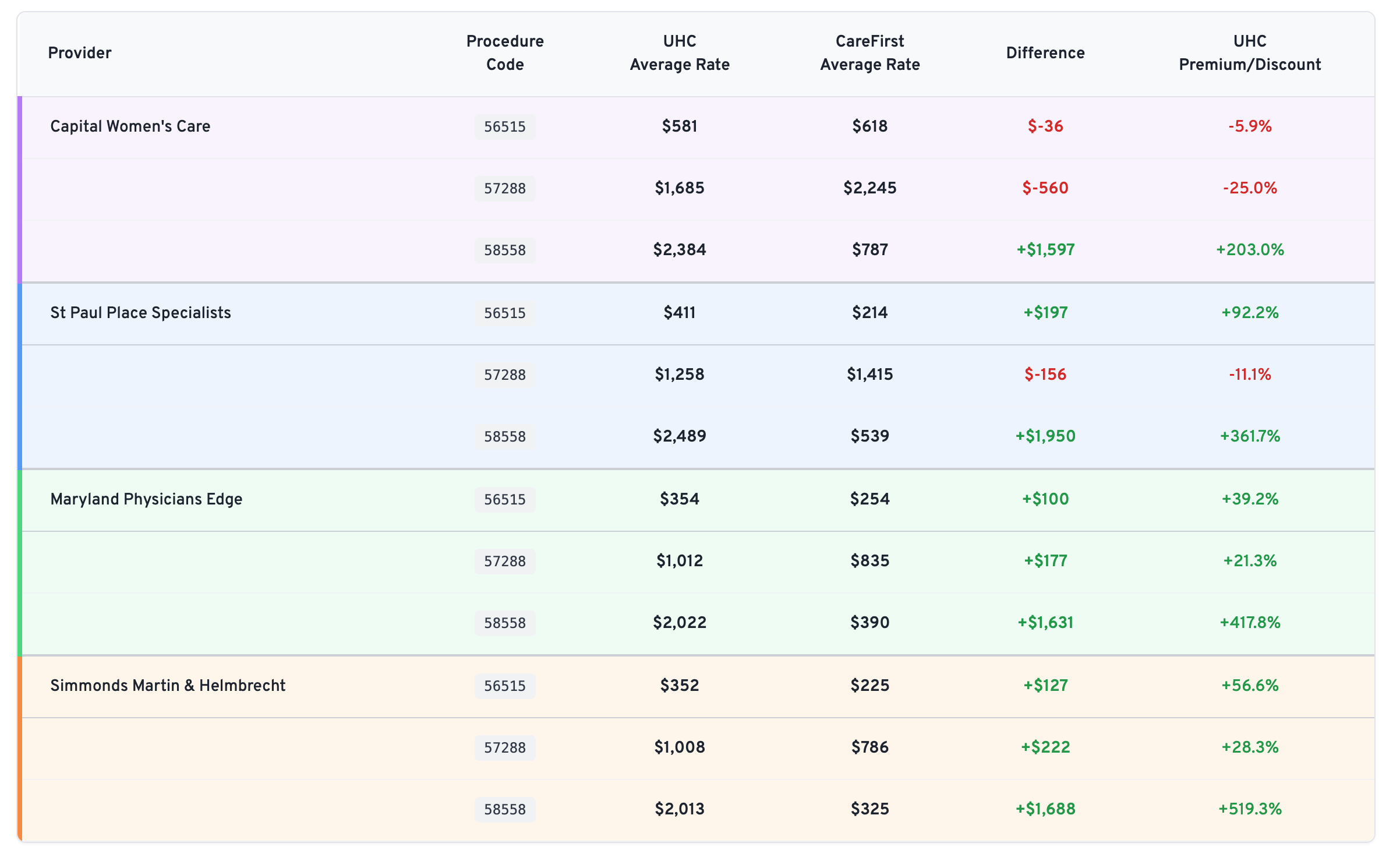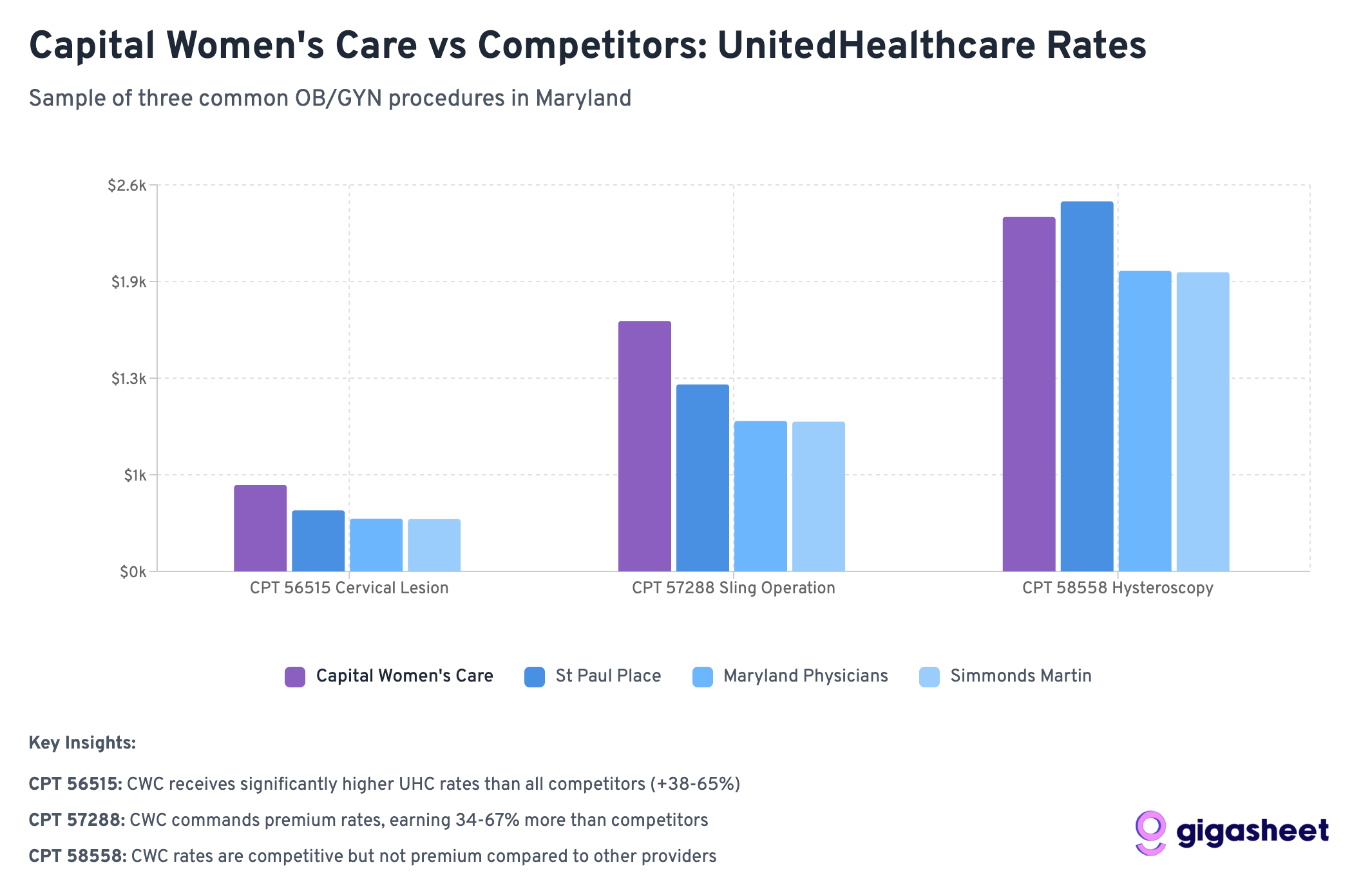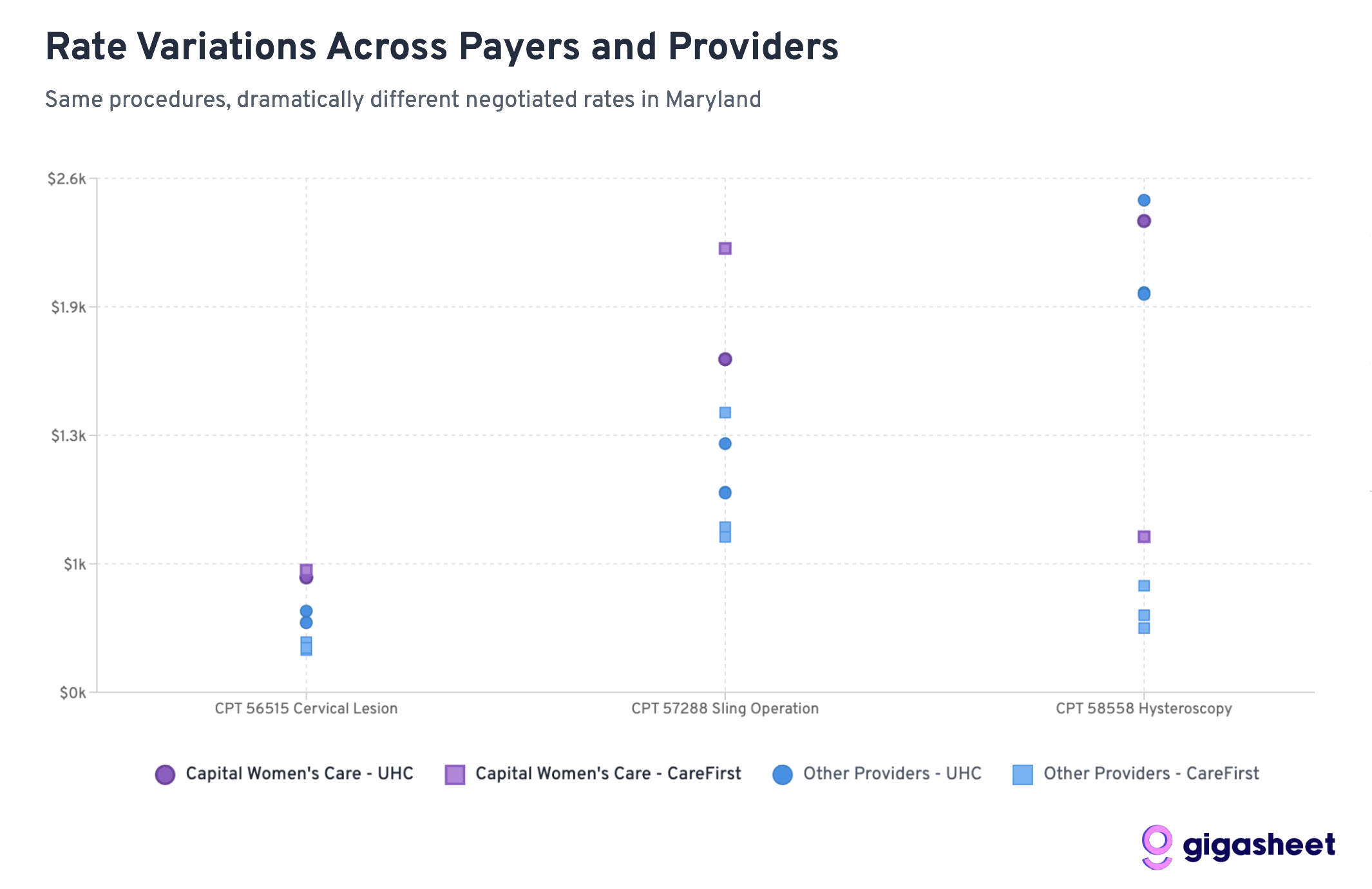By JASON HINES
That is Half 2 of Jason and Gigasheets’ investigation into the Capital Ladies’s Care vs UnitedHealthcare contract dispute through which (partially at my request) he expanded the investigation to have a look at different suppliers in the identical market. Revealing stuff!–Matthew Holt
Whereas Capital Ladies’s Care (CWC) battles UnitedHealthcare over contract phrases, a deeper have a look at Maryland’s OBGYN market reveals a posh aggressive panorama the place negotiated charges range dramatically throughout suppliers and procedures. By analyzing value transparency knowledge from each UnitedHealthcare and CareFirst BlueCross BlueShield, we are able to see precisely what every insurer pays CWC’s opponents. The outcomes are eye-opening.
The Gamers in Maryland’s OBGYN Market
Our evaluation focuses on 4 OBGYN suppliers in Maryland which have contracts with each UnitedHealthcare and CareFirst. These 4 practices had been chosen as a illustration of the broader market as a result of they’ve printed charge knowledge with each insurers, permitting for direct comparisons. Nonetheless, Maryland’s OBGYN panorama contains dozens of further suppliers, from solo practitioners to hospital-based practices, every with their very own negotiated charges that will observe totally different patterns.
The 4 suppliers in our evaluation embrace:
- Capital Ladies’s Care – The big follow on the middle of the UHC dispute, with a number of areas throughout the area
- St Paul Place Specialists (Mercy Medical Heart) – Baltimore-based OBGYN follow with established market presence
- Maryland Physicians Edge – Ladies’s well being group with OBGYN companies, now a part of Advantia
- Simmonds, Martin & Helmbrecht – Established OBGYN follow, additionally underneath the Advantia umbrella
The four-provider pattern supplies useful insights into aggressive dynamics amongst main market gamers and helps contextualize the CWC-UHC dispute inside broader trade patterns.
Following our evaluation in Half 1, we examined negotiated charges for 3 widespread gynecologic procedures:
- Code 56515: Destruction of cervical lesion (therapy following irregular Pap smears)
- Code 57288: Sling operation for stress incontinence (surgical process)
- Code 58558: Hysteroscopy with sampling (diagnostic process for irregular bleeding)
The Price Comparability: UHC vs CareFirst
Price variations within the value transparency knowledge reveals a posh aggressive panorama the place UHC pays 200-500% greater than CareFirst for hysteroscopy procedures throughout all suppliers in our pattern, whereas Capital Ladies’s Care exhibits blended positioning. Generally Capital Ladies’s Care instructions premium charges from UHC (codes 56515, 57288), different instances they’re receiving comparable charges to smaller opponents (code 58558). The info suggests each side within the CWC-UHC dispute have official arguments: CWC already receives aggressive or premium compensation, whereas charge inconsistencies throughout procedures point out room for negotiation.

Key Findings: A Story of Two Insurance coverage Methods
UHC Typically Pays Extra Than CareFirst

Throughout 12 provider-procedure mixtures, UnitedHealthcare pays increased charges than CareFirst 75% of the time. This implies CareFirst has been extra aggressive in negotiating decrease charges throughout the Maryland market.
Hysteroscopy Exhibits the Most Dramatic Variations
For Code 58558 (hysteroscopy with sampling), the speed variations are staggering:
- UHC pays 203-519% extra than CareFirst throughout all suppliers
- Common UHC charge: ~$2,200 vs CareFirst charge: ~$510
- This represents the biggest systematic distinction throughout procedures
Capital Ladies’s Care Instructions Premium Charges
CWC’s charges relative to opponents reveal why UHC could also be proof against additional will increase:
- Code 58558: CWC’s UHC charge ($2,384) is already corresponding to opponents, regardless of CWC’s bigger scale
- Code 56515: CWC will get barely higher phrases from UHC ($581) vs opponents ($352-411)
- Code 57288: CWC receives considerably increased charges from UHC ($1,685) vs most opponents ($1,008-1,258)

Vast Price Variations
Essentially the most excessive instance: Simmonds Martin & Helmbrecht receives 519% extra from UHC than CareFirst for hysteroscopy procedures (a distinction of practically $1,700 per process). These patterns recommend that whereas some procedures have established market charges, others (significantly diagnostic procedures like hysteroscopy) lack standardized pricing, contributing to the complexity of provider-insurer negotiations just like the CWC-UHC dispute.

What This Means for the CWC-UHC Dispute
CWC Already Instructions Premium Charges
The info reveals a key perception: Capital Ladies’s Care isn’t essentially getting unfair therapy from UHC. In reality, CWC typically receives increased charges than opponents from each insurers:
- For hysteroscopy (58558), CWC will get comparable UHC charges regardless of being a bigger follow that ought to theoretically have much less negotiating leverage
- For cervical procedures (56515), CWC receives 40-65% increased charges from UHC than smaller opponents
- For sling operations (57288), CWC’s UHC charge ($1,685) considerably exceeds most opponents
This sample suggests UHC’s resistance to additional charge will increase could also be economically rational relatively than punitive.
Trade-Vast Price Fragmentation
The huge variations between UHC and CareFirst charges throughout all suppliers spotlight basic pricing inefficiencies in healthcare. Nonetheless, inside every insurer’s community, CWC persistently instructions premium charges, suggesting their market place is already sturdy.
Scale vs. Negotiating Energy
Standard knowledge suggests bigger practices ought to obtain decrease per-unit charges as a consequence of quantity efficiencies. The info exhibits the alternative: CWC typically receives increased charges than smaller opponents, indicating they’ve efficiently leveraged their measurement for premium pricing relatively than quantity reductions.
The Broader Market Dynamics
CareFirst’s Market Energy
CareFirst BlueCross BlueShield seems to have leveraged its place as Maryland’s dominant insurer to barter considerably decrease charges throughout the board. With roughly 50% market share in Maryland, CareFirst can drive tougher bargains with suppliers who can’t afford to lose entry to half their potential affected person base.
UHC’s Perspective Turns into Clearer
UnitedHealthcare’s place within the dispute good points context when considered in opposition to competitor charges. UHC is already paying CWC premium charges in comparison with different Maryland OBGYN suppliers. From UHC’s perspective, additional charge will increase would create a fair bigger hole between what they pay CWC versus smaller practices.
The Economics of Supplier Consolidation
The info illustrates a key stress in healthcare consolidation: giant practices argue their measurement justifies increased charges as a consequence of high quality and comfort, whereas insurers fear about paying premium costs for what must be commodity companies. CWC seems to have efficiently established premium pricing, making UHC’s resistance to additional will increase economically comprehensible.
Trying Ahead: What This Means for Healthcare Prices
The Worth Transparency Revolution
This evaluation is just attainable due to federal value transparency necessities that took impact in 2021. For the primary time, we are able to see precisely what insurance coverage corporations pay totally different suppliers for a similar companies, revealing the large hidden variations in our healthcare system.
Market Effectivity Questions
The info raises basic questions on market effectivity:
- Why does the identical process range by 500% between insurers on the identical supplier?
- Are sufferers getting higher care when insurers pay extra, or are some insurers merely paying inflated charges?
- How can sufferers make knowledgeable choices when charge variations are this excessive?
Regulatory Implications
These findings might entice regulatory consideration, significantly round:
- Whether or not charge variations this excessive serve any official objective
- How to make sure sufferers aren’t penalized for insurance-provider charge disputes
- Whether or not value transparency alone is enough to drive market effectivity
Conclusions: Each Sides Have Legitimate Arguments
The Capital Ladies’s Care vs UnitedHealthcare contract dispute turns into extra nuanced when considered by aggressive charge knowledge. Our evaluation reveals that each side can level to official proof supporting their positions:
Capital Ladies’s Care’s Case:
- Price Inconsistencies: For some procedures like hysteroscopy (58558), CWC receives related UHC charges to a lot smaller opponents, regardless of CWC’s bigger scale and presumably increased overhead prices.
- CareFirst Comparability: CWC’s considerably increased charges from CareFirst for sure procedures (like sling operations at $2,245 vs UHC’s $1,685) recommend room exists for UHC charge will increase.
- Market Place Justification: As Maryland’s largest OBGYN follow, CWC can argue their scale, comfort, and complete companies warrant premium compensation.
UnitedHealthcare’s Case:
- Already Premium Charges: Throughout a number of procedures, CWC receives increased charges from UHC than smaller opponents (40-65% increased for cervical procedures), indicating UHC already acknowledges CWC’s worth.
- Financial Reasonableness: Additional charge will increase would create a fair bigger premium hole between CWC and different suppliers, doubtlessly making UHC’s community economics unsustainable.
- Blended Efficiency: The inconsistent sample throughout procedures suggests CWC’s premium positioning isn’t uniformly justified throughout all companies.
The Complexity of Healthcare Negotiations:
Moderately than a transparent case of unfair therapy, the information reveals the inherent complexity of healthcare charge negotiations. Each events can legitimately level to particular procedures and comparisons that help their place, whereas the general image stays genuinely blended.
This evaluation suggests the dispute displays broader challenges in healthcare pricing: How do you pretty compensate scale and market place whereas sustaining cheap value constructions? The aggressive knowledge exhibits there’s no apparent “proper” reply; simply alternative ways to interpret the identical complicated market dynamics.
The actual perception isn’t that one aspect is clearly proper, however that healthcare charge negotiations contain official competing pursuits the place cheap folks can have a look at the identical knowledge and attain totally different conclusions about honest compensation.
Jason Hines is CEO of Gigasheet which delivers AI-powered value transparency market intelligence.. This was first posted on their company weblog
Be aware: This evaluation relies on a pattern of value transparency knowledge filed by UnitedHealthcare and CareFirst BlueCross BlueShield, as mandated by federal laws. The speed calculations are aggregations of information from a number of contracts and areas inside every supplier group. To broaden our charge evaluation from Half 1, we resolved EINs to group names utilizing public knowledge sources.

